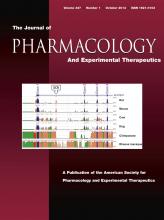Abstract
Abnormal involuntary movements or dyskinesias are a serious complication of long-term l-DOPA treatment of Parkinson’s disease, for which there are few treatment options. Accumulating preclinical data show that nicotine decreases l-DOPA–induced dyskinesias (LIDs), suggesting that it may be a useful antidyskinetic therapy for Parkinson’s disease. Here, we investigated whether nicotinic acetylcholine receptor (nAChR) agonists reduced LIDs in nonhuman primates. We first tested the nonselective nAChR agonist 1, 6,7,8,9-tetrahydro-6,10-methano-6H-pyrazino[2,3-h][3]benzazepine (varenicline), which offers the advantage that it is approved by the U.S. Food and Drug Administration for use in humans. 1-Methyl-4-phenyl-1,2,3,6-tetrahydropyridine (MPTP)–lesioned monkeys (n = 23) were first administered l-DOPA/carbidopa (10/2.5 mg/kg) twice daily 5 days/week until stably dyskinetic. Oral varenicline (0.03–0.10 mg/kg) decreased LIDs ∼50% compared with vehicle-treated monkeys, whereas nicotine treatment (300 µg/ml in drinking water) reduced LIDs by 70% in a parallel group of animals. We next tested the selective α4β2*/α6β2* nAChR agonist TC-8831 [3-cyclopropylcarbonyl-3,6-diazabicyclo[3.1.1]heptane] on LIDs in the same set of monkeys after a 10-week washout. We also tested TC-8831 in another set of MPTP-lesioned monkeys (n = 16) that were nAChR drug–naïve. Oral TC-8831 (0.03–0.3 mg/kg) reduced LIDs in both sets by 30–50%. After a washout period, repeat TC-8831 dosing led to a greater decline in LIDs (60%) in both sets of monkeys that was similar to the effect of nicotine. Tolerance to any nAChR drug did not develop over the course of the study (3–4 months). NAChR drug treatment did not worsen parkinsonism or cognitive ability. These data suggest that nAChR agonists may be useful for the management of dyskinesias in l-DOPA–treated Parkinson’s disease patients.
Footnotes
- Received June 28, 2013.
- Accepted July 30, 2013.
This work was supported by the National Institutes of Health National Institute of Neurological Disorders and Stroke [Grants NS59910, NS65851].
- Copyright © 2013 by The American Society for Pharmacology and Experimental Therapeutics
JPET articles become freely available 12 months after publication, and remain freely available for 5 years.Non-open access articles that fall outside this five year window are available only to institutional subscribers and current ASPET members, or through the article purchase feature at the bottom of the page.
|






